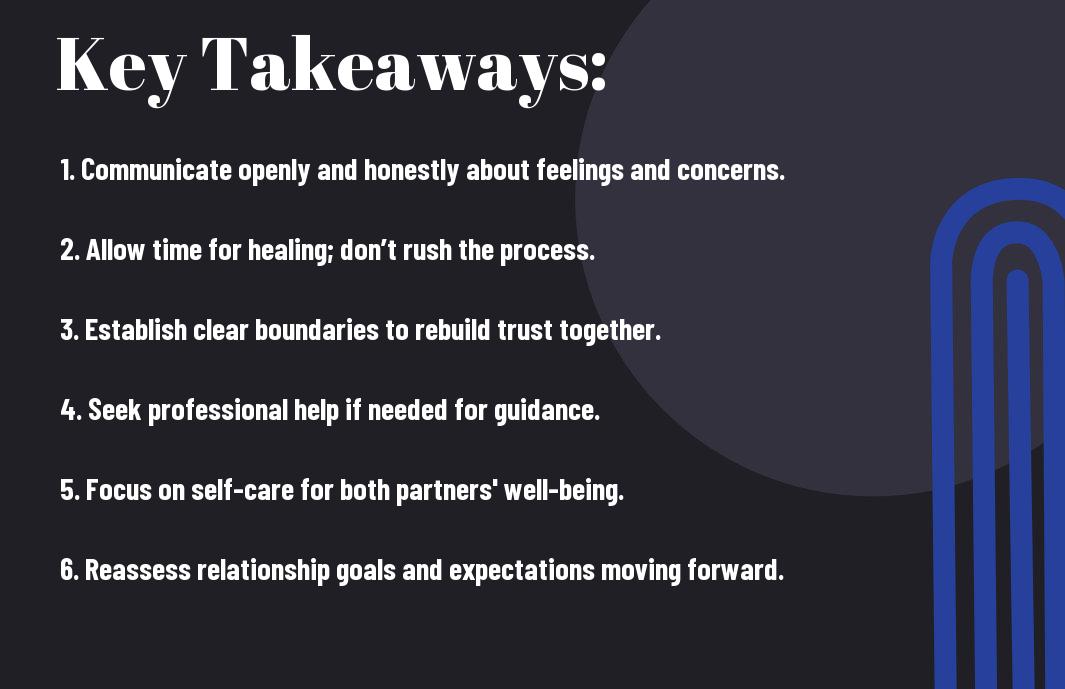You may feel overwhelmed and hurt after discovering your spouse’s infidelity, but supporting them through this difficult time can lead to healing and growth for both of you. This guide will provide you with practical steps to navigate these challenging emotions while maintaining your personal boundaries. Understanding the complexities of trust and forgiveness can help you rebuild your relationship and work towards a stronger future together. By taking deliberate actions and fostering open communication, you can create a pathway towards reconciliation and deeper intimacy.

Key Takeaways:
- Open communication is imperative; allow both partners to express their feelings and concerns without judgment.
- Establish boundaries that are clear and mutually agreed upon to help rebuild trust.
- Seek professional help, such as couples therapy, to guide the healing process effectively.
- Practice patience, as healing from infidelity takes time and each partner may process emotions differently.
- Reflect on the underlying issues that contributed to the affair to address and prevent future problems.
- Focus on rebuilding intimacy through quality time, emotional support, and compassion.
- Ensure you take care of your own emotional well-being while supporting your partner’s healing journey.


Understanding Infidelity
Before you can effectively support your spouse after infidelity, it’s vital to understand what infidelity means. It often signifies a breach of trust and loyalty that can lead to profound emotional turmoil. Infidelity isn’t just a physical act but may involve emotional connections that complicate feelings and resolutions. Recognizing the reasons behind this betrayal can assist you in navigating the road to healing.
The Emotional Impact of Cheating
The emotional ramifications of cheating are vast and complex, impacting both partners. Infidelity can lead to feelings of betrayal, confusion, and deep-seated resentment. As you confront these feelings, it’s vital to acknowledge your own emotions while also respecting and understanding your spouse’s turmoil. Communication will be key to navigating this difficult phase.
Types of Infidelity
When dealing with infidelity, it’s important to understand the various types of infidelity that exist. Below are some prevalent forms:
- Physical infidelity – Engaging in sexual intercourse with someone outside the relationship.
- Emotional infidelity – Forming a deep emotional connection with another person.
- Online infidelity – Engaging in romantic or sexual chats or relationships through digital platforms.
- One-night stands – Brief sexual encounters without emotional attachment.
- Vicarious infidelity – Engaging with someone through fantasy or inquiring about open relationships.
This classification can help you understand the depths of betrayal and the issues that need to be addressed in your relationship.
| Type | Description |
| Physical infidelity | Includes sexual acts with someone outside the primary relationship. |
| Emotional infidelity | Involves forming deep emotional bonds that affect your primary relationship. |
| Online infidelity | Engaging in sexual or romantic activities through the internet. |
| One-night stands | Transitory sexual encounters without long-term connection. |
| Vicarious infidelity | Exploring emotions or fantasies around cheating without actual physical contact. |
Even the acknowledgement of the myriad types of infidelity can be overwhelming. Each type carries its own set of challenges and resulting emotional repercussions. Understanding these intricacies is vital as you seek to work through the healing process. The most common types you might encounter include:
- Physical infidelity – The most recognized form where sexual actions transpire outside the partnership.
- Emotional infidelity – Leading to emotional detachment in your relationship.
- Online infidelity – Temptations arising from digital interactions.
- One-night stands – Brief, potentially damaging encounters.
- Vicarious infidelity – Exploring infidelity conceptually rather than physically.
This exploration can set the stage for necessary conversations as you work together to rebuild trust and understanding.
Assessing Your Relationship
You need to take a step back and evaluate the overall health of your relationship. This means examining the emotional connections, shared values, and mutual respect that exist between you and your spouse. Consider factors like how you both handle conflict, the level of intimacy, and what led to the infidelity. Recognizing these elements will help you understand whether your relationship has a solid foundation to rebuild upon or if you need to reassess your next steps.
Evaluating Trust and Commitment
The first step in assessing your relationship is to evaluate the trust and commitment that exist between you and your spouse. Analyze how the betrayal has impacted your feelings of safety and reliance on each other. Identifying whether you can still uphold a sense of partnership after infidelity will be important for moving forward.
Open Communication with Your Spouse
To rebuild your relationship, you must prioritize open communication with your spouse. This means creating a safe space where both of you can express your feelings honestly without fear of judgment or retaliation. Discussing your emotions candidly will help clarify misunderstandings and foster vulnerability.
Trust develops through ongoing dialogue, and consistent, open communication can serve as a healing mechanism for both partners. It’s vital to listen actively to each other’s perspectives, allowing space for honesty and vulnerability. This process may require setting aside time to address your thoughts, engage in difficult conversations, and discuss boundaries and expectations. By being transparent, you are laying the groundwork for a healthier connection and a path toward renewal.
Providing Emotional Support
Unlike many assume, providing emotional support after infidelity involves more than just offering sympathy. You must create a safe and nurturing environment where your spouse feels comfortable expressing their feelings. This might mean spending time together, validating their emotions, and showing empathy during this challenging period. It’s imperative to be patient and understanding, as trust takes time to rebuild and healing is a gradual process.
Listening Without Judgment
Providing a judgment-free space for your spouse to share their thoughts and feelings is vital. Listening attentively without interrupting or criticizing will allow them to process their emotions openly. This practice fosters trust and encourages honest communication, which can be the first step toward rebuilding your relationship.
Encouraging Healing and Growth
Before you can move forward together, it’s important to encourage healing and personal growth for both you and your spouse.
Without this encouragement, lingering resentment or unresolved feelings can hinder your progress. Support your spouse as they explore their emotions and seek professional guidance, if necessary. Both of you should focus on individual growth while also defining what healing looks like in your relationship. Open dialogue about goals and changes will not only strengthen your bond but also lay the groundwork for a more trusting and fulfilling partnership moving forward.
Setting Boundaries
Not establishing clear boundaries can lead to misunderstandings and further hurt feelings in your relationship. It’s imperative to communicate openly with your spouse about what is acceptable and what is not. Discuss your feelings and fears, and create a mutual understanding that both of you are committed to rebuilding trust. This will help you navigate your relationship more effectively as you move forward together.
Establishing Trust-Building Guidelines
Establishing trust-building guidelines requires both partners to agree on specific actions and behaviors that promote healing. This might include regular check-ins about feelings, transparency concerning communication with others, and commitments to avoid situations that led to the infidelity. By setting these explicit guidelines, you both create a framework for rebuilding trust and moving forward positively.
Maintaining Personal Space
With every relationship, especially after a betrayal, it’s imperative to maintain personal space. Each partner should have the opportunity to reflect on their own feelings and emotions independently. This space can help you both regain your individual identities within the relationship, ultimately leading to a healthier dynamic as you heal together.
But, it’s important to ensure that this personal space doesn’t transform into emotional distancing. You should use this time to engage in self-care and personal growth while remaining attentive to your spouse’s needs. Balance is key; take time for yourself, but also keep the lines of communication open. If either of you feels *overlooked*, it can lead to resentment. Prioritize meaningful conversations during this period, reinforcing your commitment to each other. Embrace these moments to share your *thoughts*, *fears*, and *hopes* as you navigate through this challenging process together.
Seeking Professional Help
Now, consider seeking professional help as you navigate this challenging time. A therapist can provide a safe space for both of you to process emotions and gain insights into your relationship. Visiting resources like How to Build Trust with Your Partner After Infidelity can offer strategies on rebuilding your connection. This guidance might be vital in facilitating open communication and addressing underlying issues that contributed to the infidelity.
The Benefits of Couples Therapy
Below, couples therapy serves as a valuable tool for healing after betrayal. This process allows both partners to express their feelings, ultimately fostering a better understanding of each other. A skilled therapist can guide discussions that might otherwise be too difficult to tackle on your own, leading to improved communication and a greater sense of empathy.
Individual Counseling for Both Partners
Counseling can help each partner individually work through their feelings and develop coping strategies. This personalized support is necessary, as it allows you to understand your emotions deeply and address personal issues that may have influenced your relationship. Moreover, individual therapy promotes personal growth and reflection, equipping both partners to contribute positively to the relationship in the long run.
Hence, the benefits of individual counseling can be transformative. It gives you a chance to explore your feelings in a safe environment, helps you identify underlying emotional triggers, and guides you toward more constructive behaviors. Moreover, making progress individually can lead to a stronger partnership overall, as you both learn to handle your emotions more effectively, ultimately fostering a sense of healing and understanding in your relationship.
Rebuilding Trust
Once again, the journey to rebuild trust takes time, patience, and effort from both partners. It is imperative for you to acknowledge the pain caused and allow space for healing. Establishing a foundation of honesty will pave the way for a stronger relationship moving forward. You must both commit to open communication and create strategies to prevent future betrayals, fostering a supportive environment where trust can flourish once more.
Steps to Reconnect with Your Spouse
Above all, focus on fostering emotional intimacy through shared activities and open dialogues. Prioritize your spouse’s feelings by listening actively and validating their concerns. Setting aside dedicated time for each other will help rebuild the connection that may have been lost. Emphasizing mutual understanding and support will cultivate a deeper bond necessary for healing.
Importance of Transparency
Transparency plays a vital role in the healing process, as it creates a sense of safety and security for both partners. You must be willing to share your thoughts and feelings, which will help in mending the wounds. When you are open about your actions and emotions, your spouse can begin to trust you again and understand your commitment to the relationship.
Plus, being transparent involves sharing not only your daily activities but also your emotions. This openness can significantly reduce feelings of distrust and uncertainty. When you keep your spouse informed and involved, it establishes a framework for reliability. Honesty fosters accountability; when you freely communicate, it increases the chances of avoiding misunderstandings in the future. Transparency not only helps in rebuilding trust but also strengthens your relationship dynamics overall.
Conclusion
Conclusively, supporting your spouse after infidelity requires patience, open communication, and a willingness to rebuild trust. By actively listening to their feelings, setting clear boundaries, and engaging in couples therapy if needed, you can foster an environment conducive to healing. It’s imperative to take one step at a time, allowing both of you to navigate this complex journey together. As you move forward, be sure to prioritize your emotional well-being while maintaining a commitment to the relationship, ensuring a stronger foundation built on honesty and understanding.
FAQ
Q: How can I start a conversation with my spouse after infidelity has occurred?
A: Initiating a conversation about infidelity can be challenging. Start by finding a calm and private setting where both of you feel comfortable. Approach the topic gently, expressing your feelings and concerns without placing blame. Use “I” statements to communicate how the situation has affected you, and invite your spouse to share their perspective. Active listening will be important in this conversation.
Q: What steps can I take to rebuild trust in my marriage after infidelity?
A: Rebuilding trust takes time and effort from both partners. It often begins with open and honest communication. The cheating spouse should take accountability for their actions and be transparent about their feelings and choices. Regular check-ins on each other’s emotional states and boundaries can help rebuild faith and safety in the relationship. Counseling may also be beneficial to guide both individuals through this process.
Q: Should I consider counseling or therapy after my spouse has cheated, and why?
A: Seeking counseling is highly advisable after infidelity. Professional therapists can provide a safe space for both partners to express their feelings and facilitate healthy conversation. A therapist can also offer tools and strategies to manage emotions, communicate effectively, and work through unresolved issues. Couples therapy can be vital in aiding the healing process and establishing stronger foundations for the relationship moving forward.
Q: How important is self-care for the spouse who has been cheated on?
A: Self-care is vital for anyone dealing with the emotional aftermath of infidelity. It is vital to prioritize personal well-being by engaging in activities that bring joy, reduce stress, and promote mental health. Establishing a support system involving friends and family, keeping a journal, or practicing mindfulness can be beneficial. Taking care of yourself not only helps navigate your feelings but also strengthens your ability to address the relationship’s challenges.
Q: What signs indicate that my spouse is genuinely remorseful after cheating?
A: Genuine remorse typically involves a combination of transparency, accountability, and a consistent change in behavior. Look for your spouse to openly acknowledge their actions, express true sadness about the pain they’ve caused, and demonstrate a willing commitment to repair the relationship. They should actively participate in discussions about feelings and boundaries and be patient and understanding as you both navigate this difficult period. Consistency in these behaviors over time can be a strong indicator of their sincerity.
